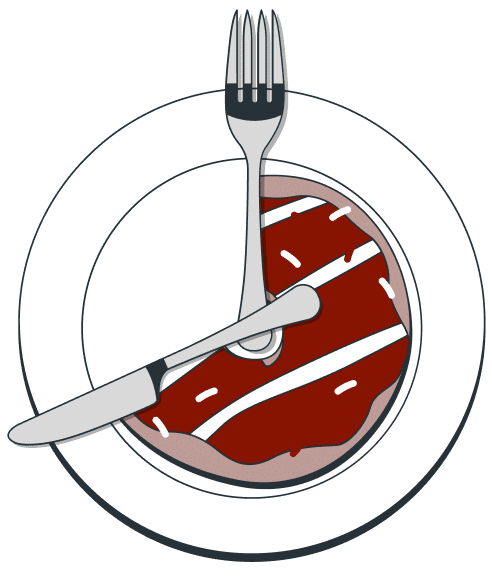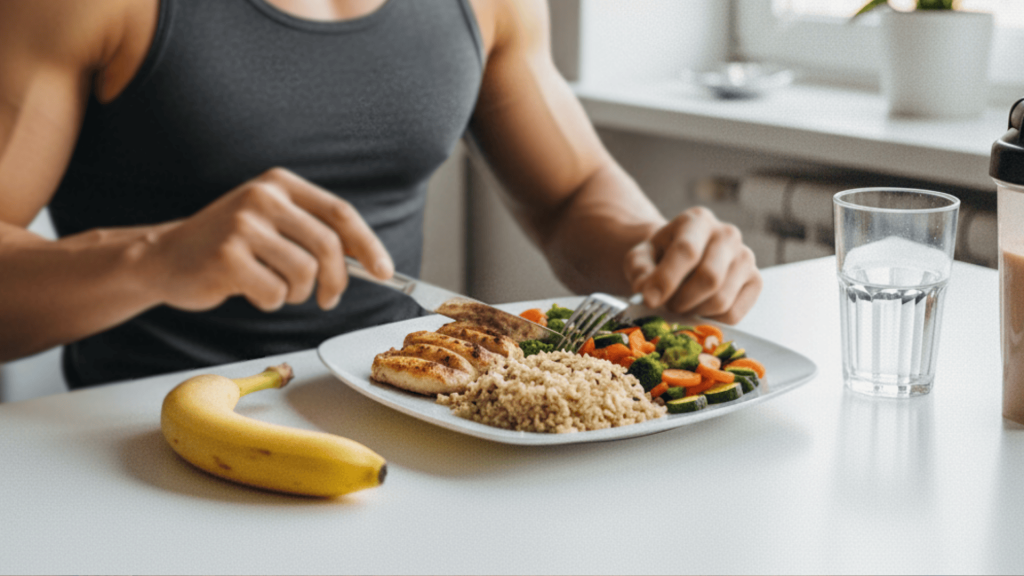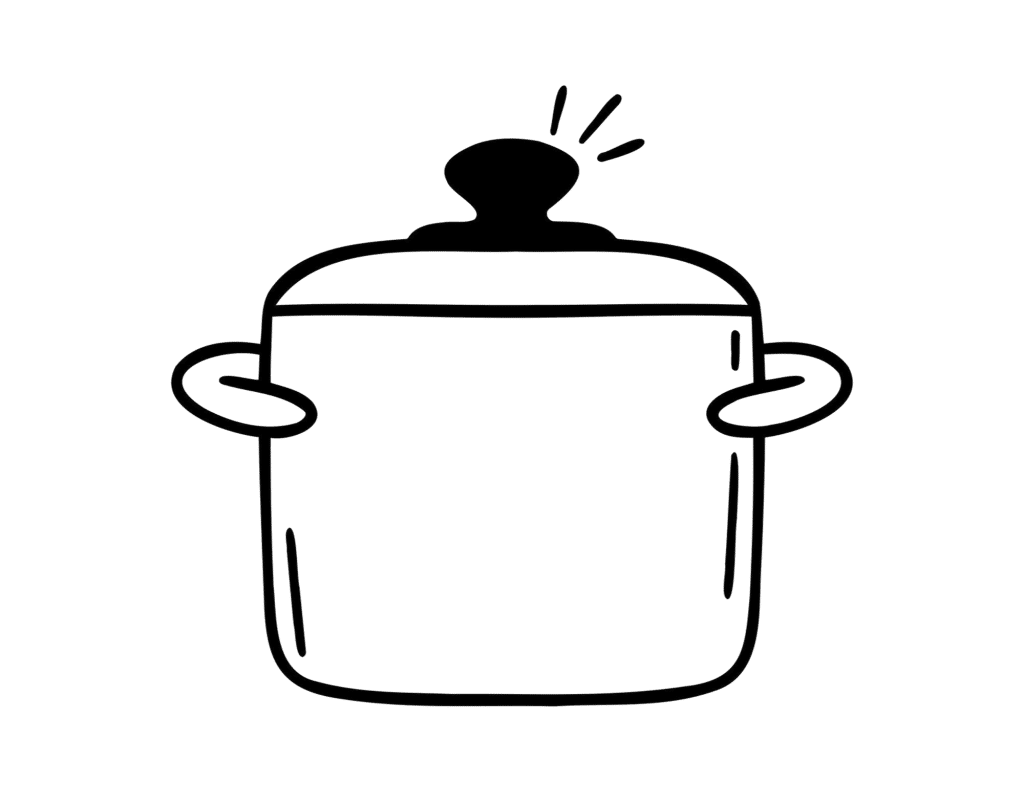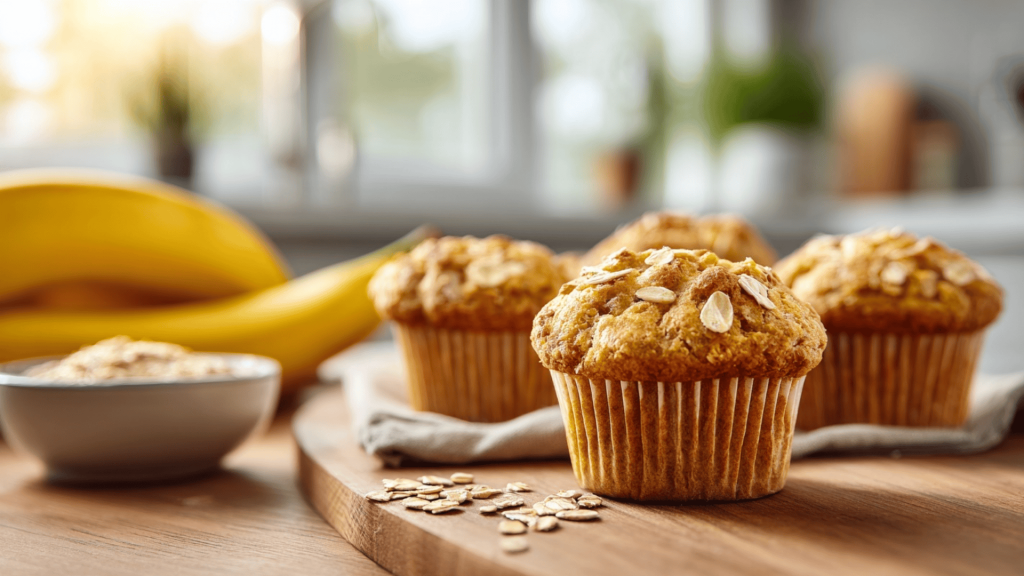Protein gets all the credit for building muscle, but carbohydrates are the unsung heroes that make muscle growth possible.
While protein directly stimulates muscle protein synthesis, carbs fuel the hard training sessions, preserve workout quality, and support recovery, allowing your muscles to actually grow and adapt.
Many people mistakenly believe they can build muscle solely on protein, but research consistently shows that combining adequate protein with sufficient carbohydrates yields better muscle-building results.
Understanding how carbs support muscle growth and which types work best can help you optimize your nutrition for maximum gains while maintaining energy and performance.
Are Carbs Good for Building Muscle?
Protein is what directly builds muscle, but carbs make it possible. Carbohydrates don’t stimulate muscle protein synthesis like amino acids do.
Instead, they fuel hard training, preserve workout quality, and support recovery afterward.
Low-carb approaches can still work if protein and calories are sufficient, but many lifters notice reduced performance, especially with high training volumes.
The bottom line is simple: most people build muscle more effectively with adequate carbs plus adequate protein, not protein alone.
Carbs and Their Roles in Muscle Building

Carbohydrates don’t directly build muscle the way protein does, but they play three critical roles that allow muscle growth to happen effectively: fueling workouts, speeding recovery, and protecting muscle tissue.
1. Fuel & Work Output
Carbs are stored in the muscles as glycogen, which is the primary fuel source for lifting weights and high-intensity training.
When glycogen is low, strength, endurance, and overall performance drop, and muscle breakdown increases. Adequate carbs mean stronger, more productive sessions.
2. Recovery
After training, glycogen stores need to be restored. Eating carbs post-workout helps refill them, and when carbs are paired with protein, the process is even faster.
This is especially valuable if you train again later in the day or on back-to-back days.
3. Protein Sparing
Carbs stimulate insulin, which reduces muscle protein breakdown.
This “protein-sparing” effect ensures that the protein you eat is used for building and repairing muscle rather than being burned as fuel.
Protein remains the driver of muscle growth, but carbs help protect those gains.
Simple vs Complex Carbs: Which Is Better for Muscle Building?
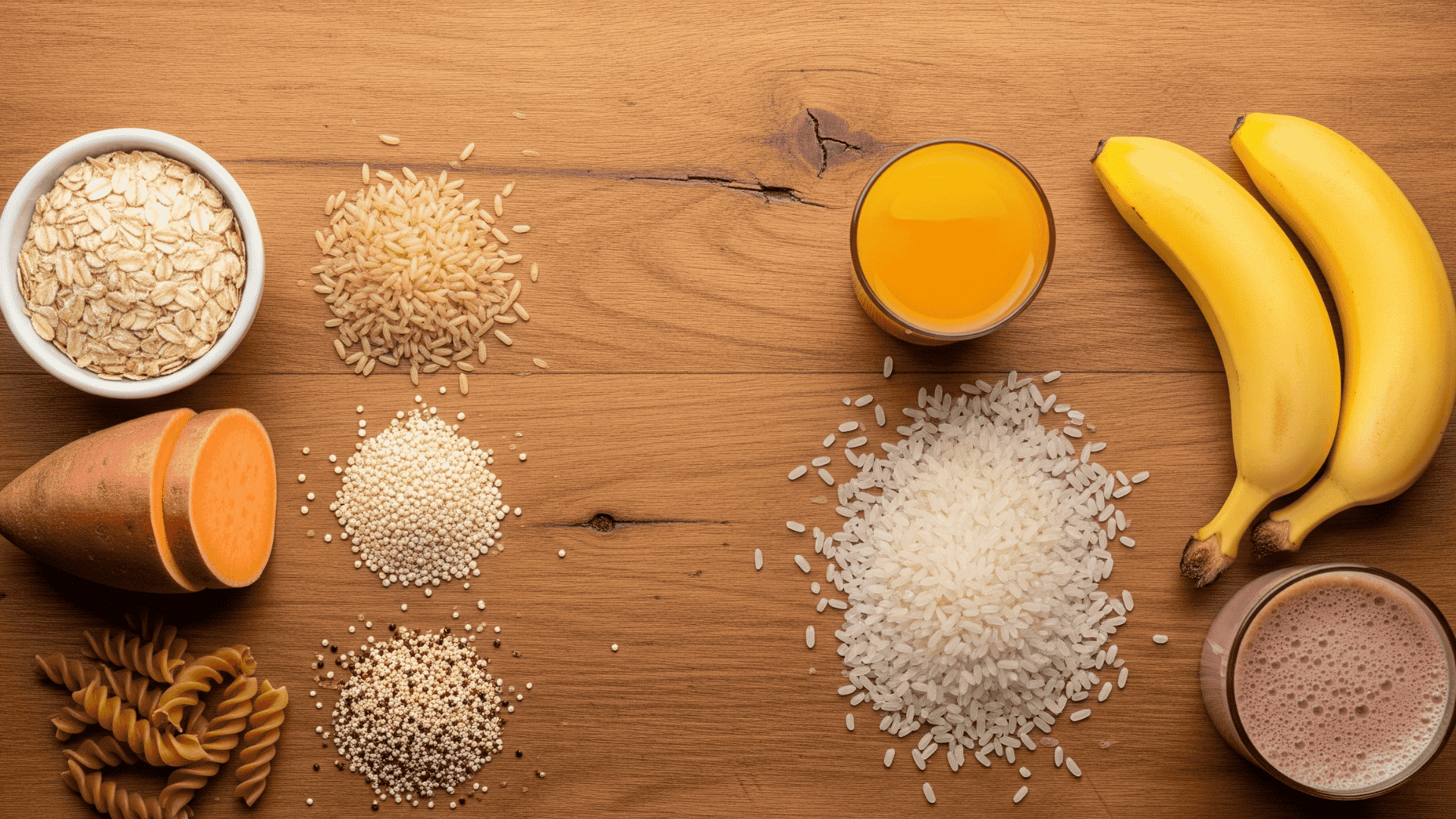
The debate between simple and complex carbohydrates for muscle building isn’t about one being universally better – it’s about using the right type at the right time for optimal results.
Complex Carbohydrates: The Foundation
| Benefits | Best Uses | Examples |
|---|---|---|
| Sustained Energy | Daily meals, pre-workout fuel | Oats, brown rice, sweet potatoes |
| Stable Blood Sugar | 1-4 hours before training | Quinoa, whole grain pasta, legumes |
| Nutrient Dense | General muscle-building diet | Fruits, vegetables, whole grains |
| High Fiber Content | Satiety and digestive health | Beans, lentils, whole grain breads |
Complex carbs provide steady, long-lasting energy that supports training performance and daily energy needs.
Their fiber content helps with satiety, and they often come packed with additional nutrients like B vitamins and minerals that support muscle function.
Simple Carbohydrates: Strategic Timing
| Benefits | Best Uses | Examples |
|---|---|---|
| Fast Absorption | Post-workout recovery | White rice, ripe bananas |
| Quick Glycogen Refill | During long training sessions | Fruit juice, sports drinks |
| Minimal Digestion | When stomach upset is a concern | Rice cakes, sports gels |
| Insulin Response | Paired with protein post-workout | Chocolate milk, cereal with milk |
Simple carbs shine when you need rapid energy replenishment or easy digestion. They’re particularly valuable immediately after training when your muscles are primed to absorb nutrients quickly.
Best Carbs for Muscle Growth
Carbohydrates support muscle building by fueling workouts, protecting muscle tissue, and speeding recovery. The best carb choices depend on timing and purpose; steady fuel for daily meals and fast energy when recovery is needed.
Complex Carbs
These provide long-lasting energy, fiber, and nutrients, making them ideal for most meals and pre-workout fuel eaten 1–4 hours before training.
-
Oats
-
Rice (white or brown)
-
Potatoes (sweet or regular)
-
Quinoa
-
Whole-grain pasta
-
Whole-grain breads and wraps
-
Legumes (beans, lentils, chickpeas)
-
Fruit (apples, oranges, berries)
Simple Carbs
Fast-digesting carbs help reload glycogen quickly after training or during long, high-volume sessions.
-
White rice
-
Ripe bananas
-
Fruit juice
-
Sports chews or gels
-
Chocolate milk
-
Rice cakes
-
Breakfast cereal with milk
High-Fiber, High-Protein Carbs
These options deliver carbs along with protein and fiber, making meals more balanced and satisfying.
-
Lentils
-
Chickpeas
-
Black beans
-
Kidney beans
-
Edamame
How Many Carbs Do You Really Need (and When to Eat Them)?
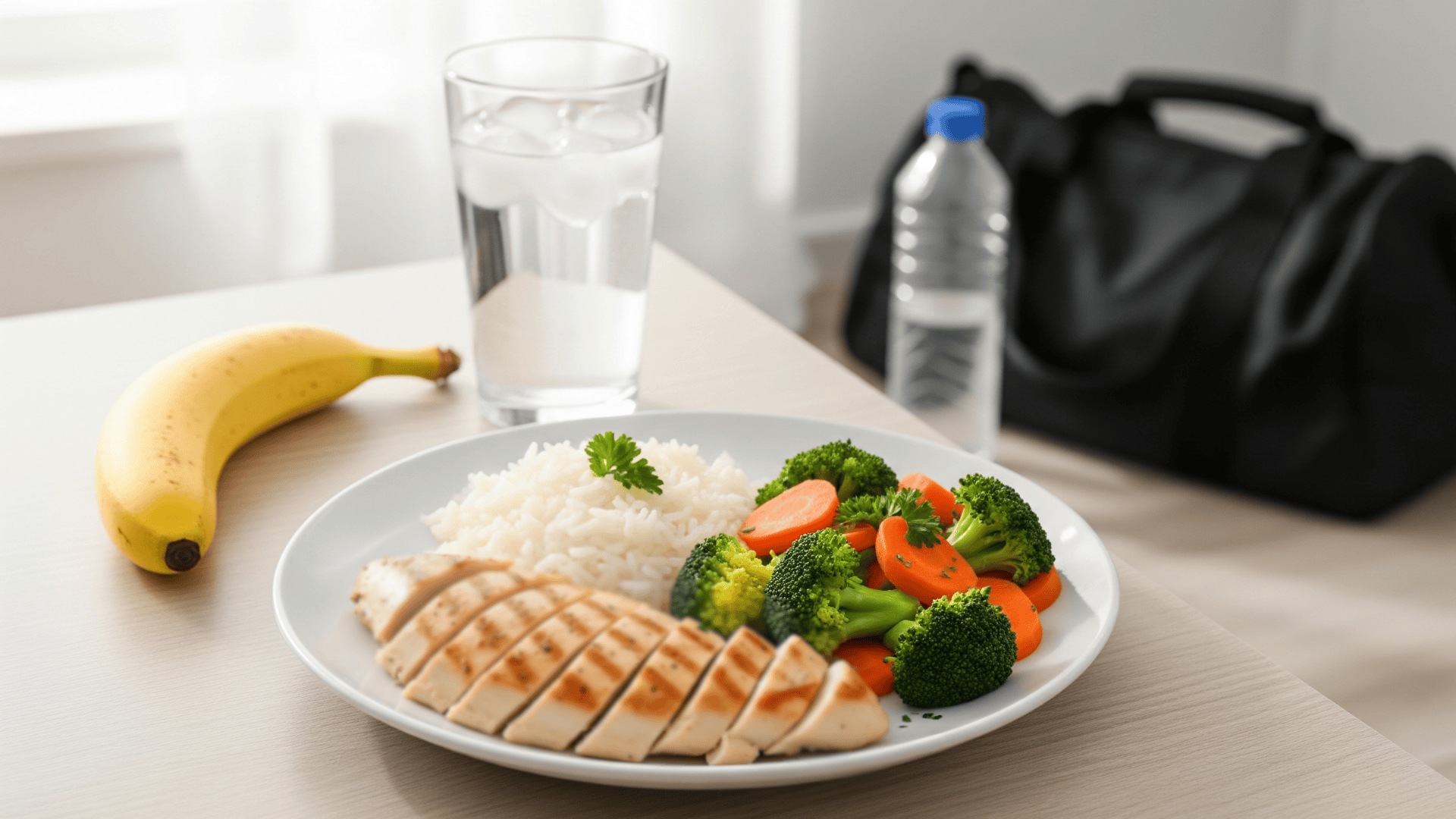
Carb needs depend on your training load. The harder and more frequent your workouts, the more glycogen you burn, and the more carbs you’ll need to recover and perform at your best.
|
Protein should remain steady at 1.6–2.2 g/kg/day since it directly drives muscle growth, while carbs fuel training and protect recovery, so protein can do its job.
Timing matters most for high-volume training. Carbs before training supply fuel, carbs during training help in long sessions, and carbs after training speed recovery.
For most lifters, daily totals matter more than precise timing, but placing carbs around workouts is the most effective strategy.
Carb Needs and Timing at a Glance
| Training Load | Daily Carb Target (g/kg) | Pre-Workout (1–4h before) | During Training | Post-Workout |
|---|---|---|---|---|
| Light to Moderate Lifting | 3–5 g/kg | Balanced meal with rice, oats, or pasta | Not needed | Regular meal with carbs + protein |
| Moderate to High Volume | 5–7 g/kg | Chicken and rice, pasta with lean meat | Optional: sports drink or fruit | Smoothie with banana + protein |
| Very High Volume / 2-a-days | 8–10+ g/kg | Carb-rich meal: potatoes, rice, or pasta | Useful: sports chews, juice |
Fast-digesting carbs + protein (e.g., chocolate milk) |
The Bottom Line on Carbs for Muscle Building
Carbohydrates aren’t just helpful for muscle building – they’re the fuel that makes consistent, intense training possible in the first place.
While protein builds the muscle tissue, carbs provide the energy for workouts that stimulate growth and the glycogen needed for recovery between sessions.
The strategic use of both complex carbs for sustained energy and simple carbs for rapid recovery creates an environment where muscle protein synthesis can occur optimally.
How do you time your carb intake around workouts? Share your favorite muscle-building carb sources and meal timing strategies in the comments below!





